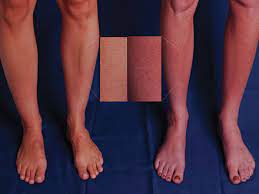Pots and Hair Loss: Overview

POTS is an acronym for Postural Orthostatic Tachycardia Syndrome, a complex condition that affects the cardiovascular system and is characterized by an abnormal increase in heart rate when a victim stands up. While the most commonly known symptoms of POTS are fatigue, fainting, and dizziness, it can also manifest with hair loss.
This detailed analysis looks at the link between POTS and hair loss. It delves into the potential causes, treatment options, and more. Let’s dive in!
What is POTS?
POTS is a complex condition that mainly affects the normal function of the ANS (autonomic nervous system). The chronic condition causes challenges in regulating primary bodily functions. Its main origin is unknown, but most cases usually result from trauma, some illness, or surgery. Popular symptoms include fatigue, hair loss, and a higher heart rate.
POTS Hair Loss – Does POTS Cause Hair Loss?
The answer is yes. Hair loss is one of the main symptoms experienced by individuals suffering from Postural Orthostatic Tachycardia Syndrome. The science behind this occurrence can be explained in different ways, and some of the factors believed to cause hair loss in POTS include stress, deficiencies in nutrition, anxiety, and hormonal imbalances. We have comprehensively explained how each of them has an impact on the
- Stress and anxiety: People with POTS often experience high stress and anxiety levels, which can lead to hair loss. Stress can cause the body to release hormones that can damage hair follicles.
- Medications and treatments: Some medications and treatments used to treat POTS can also cause hair loss, such as beta-blockers and steroids.
- Nutritional deficiencies: People with POTS are often deficient in certain nutrients, such as iron, vitamin D, and zinc, which can also contribute to hair loss. These nutrients are essential for hair growth and repair.
- Hormonal imbalances: Women with POTS may experience hormonal imbalances, such as low levels of estrogen, which can also lead to hair loss. Estrogen is a hormone that helps to promote hair growth.
Not Everyone with POTS Will Experience Hair Loss
Even as you wrap your head around the factors that cause hair loss in Postural Orthostatic Tachycardia Syndrome victims, it is important to understand that not everyone battling this syndrome is a hair loss victim.
Moreover, not every hair loss victim can attribute their problem to POTS. Please consult an expert whenever you experience hair loss caused by POTS for personalized treatment.
FAQs:
See comprehensive answers to the most commonly asked questions about the link between POTS and hair loss. we have explained more about the condition’s causes, the available treatment options, and potential underlying conditions.
Is hair loss a side effect of POTS?
While hair loss is not a direct consequence of POTS, it can be an associated symptom. Understanding the underlying causes, such as stress, medications, and nutritional deficiencies, can help in managing this aspect of POTS.
Can bald people develop Postural Orthostatic Tachycardia Syndrome?
Yes, individuals who are bald can develop POTS. Hair loss does not predispose or protect against the development of POTS. It is a condition that can affect individuals regardless of their hair status.
Can POTS syndrome cause hair loss?
Yes, POTS syndrome can lead to hair loss, particularly when exacerbated by factors like stress, medications, and hormonal imbalances. Addressing these underlying issues is crucial in managing hair health for those with POTS.
Can POTS cause scalp tenderness and hair loss?
Yes, POTS can cause scalp tenderness and hair loss. This can be attributed to the increased sensitivity of the autonomic nervous system, which may affect blood flow to the scalp. This source provides further insights: With a Side of Salt POTS Support.
Are there any specific treatments for hair loss associated with POTS?
While there is no one-size-fits-all solution, addressing the underlying causes of hair loss in POTS is key. This may involve stress management techniques, adjusting medications, addressing nutritional deficiencies, and hormone regulation.
Is hair loss permanent in POTS-related cases?
Hair loss related to POTS is often reversible, especially when underlying factors are identified and addressed promptly. With appropriate management, many individuals experience regrowth and improved hair health.
Should I consult a healthcare professional if I’m experiencing hair loss with POTS?
Absolutely. Consulting a healthcare professional with experience in both POTS and dermatology is crucial. They can perform a thorough evaluation, identify potential causes, and recommend a tailored treatment plan.
Can hair loss be a symptom of an underlying condition other than POTS?
Yes, hair loss can be a symptom of various underlying conditions. It’s important to undergo a comprehensive evaluation to rule out other potential causes and receive appropriate treatment.
Why is POTS not taken seriously?
POTS is a complex and often misunderstood condition. Its symptoms can be diverse and overlap with other disorders, leading to misdiagnosis or dismissal. Raising awareness and education about POTS is essential for proper recognition and treatment.
What is the life expectancy of someone with POTS?
POTS itself does not significantly impact life expectancy. With proper management and lifestyle adjustments, individuals with POTS can lead fulfilling lives comparable to their peers.
Conclusion
In conclusion, understanding the intricate relationship between POTS and hair loss is essential for individuals grappling with this condition. While not everyone with POTS experiences hair loss, it is a valid concern for many. By addressing underlying factors such as stress, medications, nutritional deficiencies, and hormonal imbalances, individuals can effectively manage hair health.
Consulting a healthcare professional experienced in both POTS and dermatology is crucial for a personalized approach to treatment. With the right care, individuals with POTS can navigate this aspect of their health confidently, ultimately enhancing their overall well-being and quality of life.
